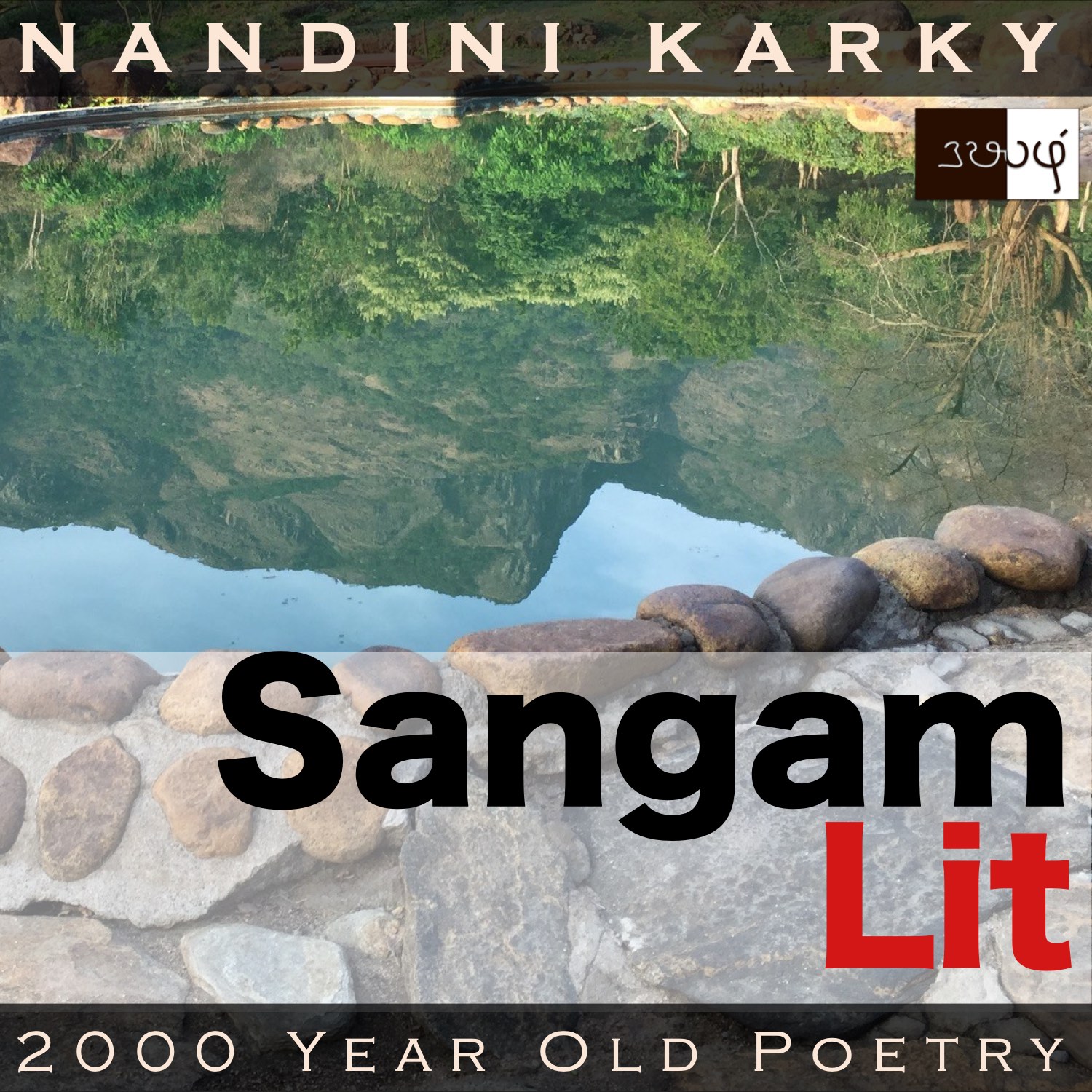Podcast: Play in new window | Download
Subscribe: Apple Podcasts | Spotify | Amazon Music | Android | iHeartRadio | TuneIn | RSS | More

In this episode, we look into the heart of a man, who has parted away from his love, as portrayed in Sangam Literary work, Natrinai 240, penned by Nappaalathanaar. Set in the drylands of ‘Paalai’ landscape, the verse speaks in the voice of a man to his heart, as he languishes with the pain of parting.
ஐதே கம்ம, இவ் உலகு படைத்தோனே-
வை ஏர் வால் எயிற்று ஒள் நுதற் குறுமகள்
கை கவர் முயக்கம் மெய் உறத் திருகி,
ஏங்கு உயிர்ப்பட்ட வீங்கு முலை ஆகம்
துயில் இடைப்படூஉம் தன்மையதுஆயினும்,
வெயில் வெய்துற்ற பரல் அவல் ஒதுக்கில்,
கணிச்சியில் குழித்த கூவல் நண்ணி,
ஆன் வழிப் படுநர் தோண்டிய பத்தல்
யானை இன நிரை வௌவும்
கானம் திண்ணிய மலை போன்றிசினே.
The opening phrase ‘ஐதே கம்ம’ packs within it three words ‘ஐது’, ‘ஏக’, ‘அம்ம’ meaning ‘slowly’, ‘walk’ and ‘listen’ respectively. The person who’s expected to walk slowly turns out to be ‘இவ் உலகு படைத்தோனே’ meaning ‘the one who created this world’, revealing the creationist ideology of this poet. The literary custom of stacking multiple adjectives to describe something can be seen in ‘வை ஏர் வால் எயிற்று’ meaning ‘beautiful, sharp, and shining teeth’. ‘ஏங்கு உயிர்ப்பட்ட’ talks about the ‘sighs of yearning’, which are bound to be there in a poem on parting. Note how the word ‘உயிர்’, which means ‘life’ in contemporary Tamil has been used to represent the word ‘breath’. The very poetry of life can be sensed in this ancient usage. The phrase ‘வெயில் வெய்துற்ற பரல்’ talks about ‘pebbles heated up by the sun’ and evokes the sense of touching a hot stone in the summer months. Learnt that ‘கணிச்சி’ is a kind of ‘pick-axe’ used to break up stones. In this verse, we also get to meet ‘யானை இன நிரை’ meaning ‘rows of elephants’. The song ends with ‘மலை போன்றிசினே’ meaning ‘like a mountain’. Guided by these glimpses, let’s proceed to tunnel through this mountain of a poem!
The man and lady have been leading a happy married life when the man had to part away from her in search of wealth. One day, as he’s walking through the drylands forest, he turns to his heart and says, “Listen, let the one who created such a world walk slowly and see! I used to hold the young girl with sharp, beautiful, shining teeth and a glowing forehead in my arms and embrace her tightly. Now, her heaving bosom would let out yearning sighs, and her sleep would be interrupted as she suffers in a state of loneliness. Here, near the pits around which pebbles are heated up by the scorching sun, using a pick-axe, the cowherds have dug up water troughs. Approaching these troughs, rows of elephants empty the water within. Such is the drylands forest that I walk on, which appears to me like an unyielding mountain!” With these words, the man expresses the anguish within him at having parted away and the worry in his heart about the state of his pining lady.
Now, for the nuances! The man starts his conversation with his heart by saying that the one who created such a world should walk in it and see it on their own! It seems like a statement made in anger at the creator. Why is the man angry? He then talks about the past remembering his beautiful lady and how he had held her close. He’s jolted to the present as he remembers how she would let out sad sighs, tossing and turning restlessly, as he is away from her. From the present state of the lady that he sees in his mind’s eye, he turns to his present seen by his eyes! There’s scorching heat everywhere and breaking the hot stones, pits have been dug up by cowherds. They have created water troughs for the cattle they take grazing in the sweltering heat. Man may propose but nature disposes, they say! Likewise, these troughs are now seized by an army of elephants, who drink up every ounce of water therein. The man seems to say that such is the forest he walks on. A dry and undesirable land, which seems to extend before his eyes, like a formidable mountain. It’s this land that the man says the creator must walk around and suffer the pain sown!
In that description of elephants seizing the water meant for cattle, the man conceals a metaphor. That of the disease of pining seizing the beauty of the lady that was meant to be embraced by him. And thus, we understand the land outside is not the one to blame but the love within him is what’s making the land outside appear harsh and unrelenting to him. So severe that is, that he takes up to inviting the creator to partake in his suffering. Now, imagine if this was the time when the man was returning home after a long separation. Then, even a mountain before him would appear like a breeze. A poem that illustrates how the inner world we create changes the colour and character of the real world outside!




Share your thoughts...